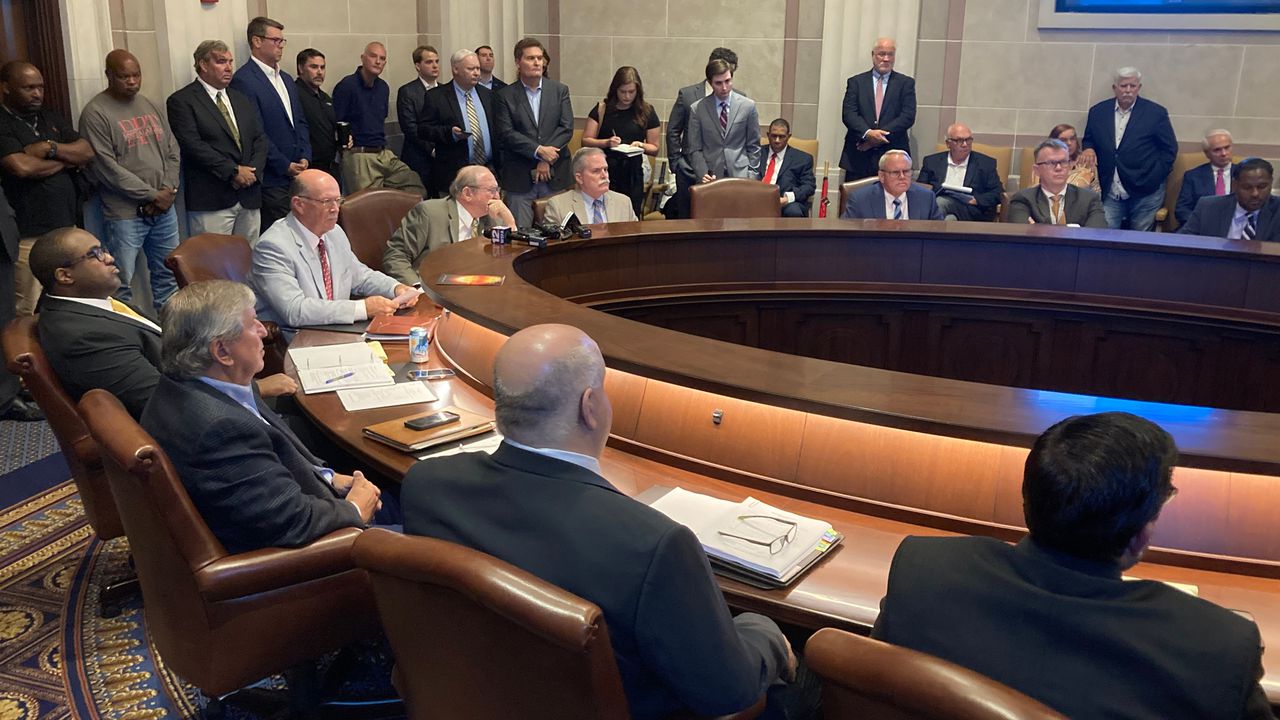Medical Cannabis Commission to try 3rd time to award licenses
Facing mounting litigation, the Alabama Medical Cannabis Commission is planning to try for a third time to issue licenses to companies hoping to participate in the state’s new industry.
At a court hearing Monday, a lawyer for the AMCC said the commission intends to vote to place an administrative stay on its previous license awards when it meets on Thursday. Then the AMCC then intends to return at a later meeting to award licenses again.
“We asked the judge to allow the commission to do what it has the authority to do, which is to issue an administrative stay on the actions it has taken to date,” AMCC attorney Mike Jackson said after Monday’s hearing. “And then in the future to conduct a new open meeting, and make the awards to the various applicants at the upcoming meeting. And the judge agreed to that.”
Montgomery County Circuit Judge James Anderson said he would extend a temporary restraining order on the licensing process until Sept. 6. On that day, the judge has scheduled another hearing on allegations that the AMCC violated the Open Meetings Act.
Anderson, who has previously said he wants no unnecessary delays in getting medical marijuana products on the market, closed Monday’s hearing with a comment that the state of Mississippi appears to be closer than Alabama to having products available.
“So, we can’t say thank God for Mississippi,” Anderson said.
The AMCC awarded 21 licenses in June but withdrew those decisions after discovering mistakes in how scores were tabulated to rank the applicants.
On August 10, the AMCC announced the mistakes were corrected and the scores were verified. It awarded licenses a second time, picking 24 companies that would cultivate, process, transfer, test, and dispense medical cannabis products. Nineteen of the 21 companies that were chosen in June were picked again, plus five more.
But the process hit another snag. Some companies that did not receive licenses filed lawsuits claiming the commission violated the state Open Meetings Act because commissioners picked their nominees during a closed portion of the August 10 meeting. The commission reopened the meeting to vote on the applicants, but only considered those that were nominated.
At a hearing on August 17, Anderson agreed to put a hold on the process after hearing initial information about the alleged Open Meetings Act violation.
William Somerville, an attorney for Alabama Always, one of the companies that claimed the Open Meetings Act violation, said he believes the pause and redo of the license awards is necessary.
“I really hope that we’ll find a way to move forward with a more rationale process,” Somerville said. “I don’t think it’s in anybody’s interest to be fighting over stuff like open meetings. I think it’s in everybody’s best interest for us to move forward with a process that observes the open meetings act, that observes the due process requirements and the Administrative Procedure Act. That way we’ll got to a logical, rational decision on who gets these licenses. I think it’s going to be a decision that everybody will be happy with down the road, or nobody can really complain about.”
Chey Garrigan, founding director of the Alabama Cannabis Industry Association, said it is unfortunate that patients in need of medical cannabis products are having to wait longer because of the legal disputes.
“It’s very unfortunate because a lot of the public is not going to understand what’s going on as far as the legal system goes,” Garrigan said after Monday’s hearing. “The only thing people that are in pain right now want to know is when can I get a card? When can I go see a doctor? When is their going to be product on the shelf?”
The Legislature authorized medical marijuana in 2021 and created the AMCC to oversee the seed-to-sale regulation of the new industry. AMCC officials have said before the licensing process stalled that they hoped products could be available by the end of this year.
Products can include gummies, tablets, capsules, tinctures, patches, oils, and other forms allowed by the legislation.
Patients who receive a medical cannabis card from a doctor will be able to buy the products at licensed dispensaries.
The products can be used to treat a wide range of conditions, including chronic pain, weight loss and nausea from cancer, depression, panic disorder, epilepsy, muscle spasms caused by disease or spinal cord injuries, PTSD, and others.
Read more: Long wait drags on for patients in Alabama as medical cannabis hits snags
